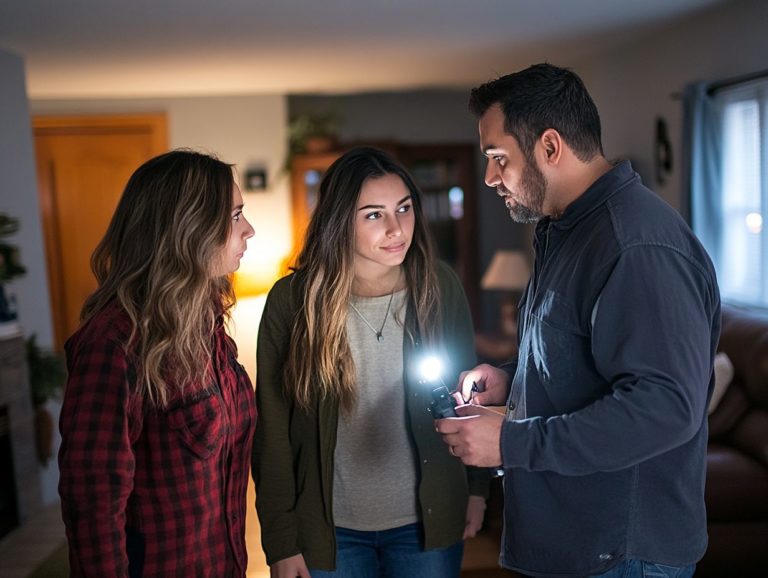Top 10 Questions First-Time Home Buyers Should Ask
Purchasing your first home is an exhilarating journey, but it can also feel quite daunting.
With numerous factors to weigh ranging from budgeting and location to mortgage options and maintenance it s essential to have the right questions in mind.
Get ready! This guide reveals the top ten questions every first-time homebuyer must ask, offering the clarity and confidence you need as you navigate this significant process.
Whether you re curious about additional costs or how to select the perfect real estate agent, this guide provides the insights you need!
Contents
- Key Takeaways:
- 1. What Is My Budget and How Much Can I Afford?
- 2. What Type of Home Is Best for Me?
- 3. How Do I Choose the Right Location?
- 4. What Are the Additional Costs of Homeownership?
- 5. What Are My Mortgage Options?
- 6. How Do I Choose a Real Estate Agent?
- 7. What Should I Look for During a Home Inspection?
- 8. How Do I Make an Offer and Negotiate?
- 9. What Are the Steps in the Closing Process?
- 10. How Do I Prepare for Maintenance and Repairs?
- What Are the Benefits of Buying a Home?
- Frequently Asked Questions
- What is the most important question first-time home buyers should ask?
- Should first-time home buyers ask about the neighborhood?
- Is it important to ask about the age and condition of the home?
- What questions should first-time home buyers ask about the home buying process?
- Are there any questions first-time home buyers should ask about the seller?
- Should first-time home buyers ask about potential additional costs?
Key Takeaways:

Kickstart your journey by determining your budget!
Consider your needs and preferences in a home, such as size and location.
Research and choose the right location based on factors like safety, schools, and amenities.
1. What Is My Budget and How Much Can I Afford?
Determining your budget as a first-time homebuyer is a crucial step in the mortgage process. It involves checking your credit score, understanding down payment options, and calculating how much of your income goes to debts.
Start by checking your credit score. This number significantly influences the mortgage terms available to you. Aim for a score above 620 to unlock a wider range of favorable interest rates.
Next, calculate your debt-to-income percentage. You can do this by dividing your monthly debt payments by your gross monthly income. Striving for a percentage of 43% or lower is often recommended to improve your chances of mortgage approval.
In terms of down payment, traditional advice often leans toward 20%. However, many lenders are open to lower percentages, easing your initial financial burden.
Lastly, don t underestimate closing costs, which typically range from 2% to 5% of the home’s purchase price. These can dramatically impact your overall budget.
By understanding these factors, you empower yourself to make informed decisions throughout your home buying journey.
2. What Type of Home Is Best for Me?
As a first-time homebuyer, choosing the right type of home is vital for aligning with your lifestyle, budget, and long-term aspirations. Explore various mortgage options while considering the unique benefits of homeownership.
Different types of homes like single-family residences, condominiums, and townhouses each come with their own advantages and financial implications.
A single-family home typically offers more space and privacy, but it may come with higher mortgage payments and increased maintenance responsibilities.
Condos often come with lower purchase prices and shared maintenance costs, making them particularly appealing if you prefer a more streamlined homeownership experience.
Townhouses offer a balance, giving you some outdoor space within a community atmosphere. However, they might also entail homeowner association fees that should be factored into your mortgage considerations.
By understanding these options, you empower yourself to make informed choices, enriching the rewarding journey of owning a home.
3. How Do I Choose the Right Location?
Choosing the right location is essential for you as a first-time homebuyer. It significantly impacts property value and influences access to community amenities, schools, and your overall quality of life.
Several factors play a crucial role in your decision-making process. For example, being close to work can dramatically reduce your commute times and enhance your work-life balance. The quality of local school districts is also incredibly important if you have or plan to have a family.
Access to parks, shopping centers, and healthcare facilities can elevate your daily living experience. To make well-informed choices, leverage online tools like neighborhood mapping services, school rating websites, and local forums to assess neighborhoods and their future potential.
This comprehensive approach will give you a well-rounded perspective on life in your chosen community.
4. What Are the Additional Costs of Homeownership?
Understanding the additional costs of homeownership is essential for first-time buyers. It prepares you for the financial responsibilities that come with owning a property, such as closing costs, maintenance, property taxes, and insurance.
These expenses can pile up quickly, often leading to unexpected financial strain. Regular maintenance tasks like lawn care, HVAC servicing, and plumbing repairs can significantly impact your monthly budget.
Property taxes can fluctuate based on local assessments, affecting your annual expenses. You should also consider surprise repairs that may arise due to wear and tear, which can throw even the best-laid budgets into disarray.
By taking these ongoing costs into account, you can develop a more precise financial plan. This allows you to save and invest while still meeting your obligations.
5. What Are My Mortgage Options?
As a first-time homebuyer, you have a variety of mortgage options available. From fixed-rate mortgages and adjustable-rate mortgages to specialized programs like FHA loans, VA loans, and USDA loans, each comes with its advantages and requirements, such as private mortgage insurance.
Understanding these differences is crucial, as they cater to various financial situations and goals. Fixed-rate mortgages offer stable payments over time, making them ideal for those planning to settle in their home long-term.
Adjustable-rate mortgages may interest you if you anticipate moving within a few years, thanks to their lower initial rates.
Programs like FHA loans are designed for low-income or first-time buyers, featuring reduced down payment options and more lenient credit requirements. VA loans are an excellent benefit for military veterans, often requiring no down payment at all.
Ultimately, evaluating your personal finances, future plans, and the broader housing market can help you pinpoint the mortgage type that aligns perfectly with your needs.
6. How Do I Choose a Real Estate Agent?

Selecting the right real estate agent is a crucial step for first-time homebuyers. A knowledgeable buyer’s agent can enhance your property search, streamline the buying process, and provide invaluable insights into the local market.
When considering candidates, evaluate their experience, especially with first-time buyers who often have unique concerns and questions.
An agent who understands the local market can offer targeted advice, helping you narrow down neighborhoods that fit your needs and budget. Effective communication is vital; an agent who listens and responds promptly can ease your anxieties and foster trust throughout the journey.
To assess an agent’s track record, review testimonials from previous clients and look at their recent sales. This ensures they possess the expertise required for a successful home-buying experience.
7. What Should I Look for During a Home Inspection?
As a first-time homebuyer, conducting a thorough home inspection is essential. It allows you to assess the property’s condition, identify potential repair costs, and ensure that your investment is sound and secure.
Understanding key areas during this process is critical. Pay attention to the home’s structural integrity, especially the foundation and roof. These components are vital for long-term durability.
Don t overlook the plumbing and electrical systems; examining these can help you spot any underlying issues that might lead to costly repairs down the line.
Keep an eye out for signs of mold or pests, as these can pose serious health risks or indicate deeper problems. Obtaining a comprehensive inspection report informs you about the home s condition and provides valuable negotiation points.
This enables you to make informed decisions and potentially secure necessary repairs before closing, ensuring your new home meets your expectations.
8. How Do I Make an Offer and Negotiate?
Making an offer and negotiating effectively is crucial for you as a first-time homebuyer. It allows you to secure your desired property at a fair price. Partnering with a skilled real estate agent can be invaluable. They help you navigate the complexities of the purchase agreement with ease.
To determine the right price, start by researching comparable properties in your area. This helps you gauge current market conditions. Examine recent sales, understand neighborhood trends, and consider the unique features of the property you re interested in.
Once you’ve established a price, effective negotiation strategies come into play. Present a strong offer that reflects both market value and your budget. When counteroffers arise, adopt a constructive approach. Focus on maintaining open communication to find common ground.
Incorporate contingencies into the agreement, such as home inspections or financing contingencies. This emphasizes your commitment while providing necessary safeguards throughout the purchasing process.
9. What Are the Steps in the Closing Process?
Navigating the closing process can feel overwhelming as a first-time homebuyer. However, grasping the essential steps reviewing closing costs, getting a loan approved, and obtaining title insurance makes your transaction much smoother.
As you embark on this journey, understanding each phase requires careful attention and preparation. Start by gathering all necessary documentation, such as income verification, tax returns, and bank statements, which your lender will request.
Understanding closing costs is crucial. They typically include fees like appraisal, inspection, and title search. Knowing these costs allows you to budget effectively.
Being aware of what to expect at the closing meeting like signing the deed and settling any outstanding fees will help ease your nerves.
By preparing and familiarizing yourself with these stages, you can approach the closing process with confidence and poise.
10. How Do I Prepare for Maintenance and Repairs?
Preparing for maintenance and repairs is a crucial element of homeownership that you, as a first-time homebuyer, should seriously consider. Budgeting for unexpected expenses protects your investment and helps you build equity over time.
Regular maintenance is your ally. It keeps essential systems running smoothly and prevents small problems from snowballing into costly repairs. By crafting a realistic budget that sets aside a portion of your monthly income, you can be ready for unforeseen situations.
It s wise to establish a specific emergency fund or follow the 1% rule of your home’s value for ongoing upkeep.
Investing in home improvement projects can significantly boost your comfort and efficiency. This ultimately leads to greater returns in both resale value and personal satisfaction.
What Are the Benefits of Buying a Home?
Buying a home opens the door to a wealth of benefits, including the chance to build equity, embrace financial responsibility, and relish the stability that homeownership offers.
Investing in a property means creating your very own sanctuary. You re laying the foundation for long-term financial growth. Over time, homes generally appreciate in value, making homeownership a savvy investment for your future.
But it s not just about financial rewards. Owning a home brings a thrilling sense of fulfillment as you make it uniquely yours!
Being rooted in a neighborhood fosters community ties. This allows you to connect with neighbors and actively engage in local events, enriching your overall experience of owning a home.
What Are the Common Mistakes First-Time Home Buyers Make?

First-time homebuyers often find themselves stumbling over common pitfalls, like underestimating costs, neglecting to check their credit score, or failing to budget adequately for future expenses. These oversights can significantly hinder your homeownership journey.
Such missteps can lead to financial strain and disappointment down the line. Familiarizing yourself with all potential expenses is essential. This includes maintenance, property taxes, and homeowners insurance.
By prioritizing a clear budget and understanding your credit situation, you empower yourself to secure better mortgage options.
Seeking advice from experienced real estate professionals can provide you with valuable insights and strategies. By taking a proactive approach to financial planning, you can confidently stride toward your dream of homeownership!
How Can I Improve My Credit Score to Qualify for a Mortgage?
Improving your credit score is essential if you’re a first-time homebuyer aiming to qualify for a mortgage. Lenders heavily weigh creditworthiness in determining both eligibility and interest rates.
By prioritizing consistent, timely payments and actively working to reduce outstanding debt, you can significantly enhance your financial profile. It’s equally important to regularly review your credit reports for any inaccuracies or discrepancies that could negatively impact your score.
Taking these proactive steps not only helps you build better money habits but also opens doors to more favorable mortgage terms. A higher credit score can lead to lower interest rates, potentially saving you thousands over the life of a loan.
Making these adjustments now can put you on the fast track to securing your dream home with financing options that are truly attractive!
What Are the Tax Benefits of Owning a Home?
Owning a home offers you a range of potential tax benefits, including mortgage interest deductions and property tax deductions. This means you can subtract the interest you pay on your loan and some of the taxes you pay on your home from your taxable income, which can significantly enhance the financial advantages of homeownership, especially for first-time buyers.
These deductions allow you to lower your taxable income, which means lower overall tax bills. For instance, the interest you pay on a mortgage in the early years can often add up to thousands, providing you with substantial savings when tax season rolls around.
You might qualify for tax credits related to energy-efficient home improvements, further bolstering your financial well-being. By thoughtfully considering these opportunities, you can make informed decisions as a first-time homebuyer and strategically incorporate these benefits into your long-term financial planning, leading to a more secure economic future.
How Can I Determine the Resale Value of a Home?
Determining the resale value of a home is crucial for you as a first-time homebuyer. Understanding market trends can significantly inform your purchasing decisions and help you anticipate potential returns on your investment down the line.
Several factors play a vital role in establishing this value. Consider the property’s location, its current condition, and the prevailing market demand. Homes situated in areas with excellent schools, convenient amenities, and low crime rates typically command higher resale values. Conversely, properties that require substantial repairs may put off potential buyers. Market fluctuations also influence how quickly a home sells and at what price.
To accurately gauge these factors, you should embark on thorough research. Explore recent sales in your desired neighborhoods and consult with real estate professionals. Their insights and assessments can prove invaluable in guiding you toward a sound investment.
What Are the Advantages of Buying a New Construction Home?
Buying a new construction home presents numerous advantages for you as a first-time homebuyer. You ll enjoy customization options, modern amenities, and often reduced maintenance costs due to new systems and materials.
New construction homes are typically equipped with energy-efficient appliances and practices. This not only lowers your utility bills but also enhances your comfort and promotes sustainability. The energy savings can make a significant difference in your overall budget, making homeownership more affordable in the long run.
Most new builds come with warranties covering repairs and replacements for various parts, providing you with peace of mind and minimizing unexpected expenses.
All these factors contribute to a more satisfying living experience, allowing you to relish your new space without the burden of frequent maintenance or costly upgrades.
Frequently Asked Questions
What is the most important question first-time home buyers should ask?

The most important question first-time home buyers should ask is, “What is my budget and how much can I afford to spend on a house?” Knowing your budget helps you find the perfect home without overspending!
Should first-time home buyers ask about the neighborhood?
Yes, first-time home buyers should definitely ask about the neighborhood. Consider factors such as safety, school districts, nearby amenities, and property values to ensure the neighborhood is a good fit for your needs and lifestyle.
Is it important to ask about the age and condition of the home?
Yes, it is crucial to ask about the age and condition of the home. This will give you an idea of any major repairs or renovations that may be needed, which can also affect price negotiations.
What questions should first-time home buyers ask about the home buying process?
First-time home buyers should inquire about the steps and timeline of the home buying process. This includes finding a lender, getting pre-approved for a mortgage, making an offer, and completing the closing process.
Are there any questions first-time home buyers should ask about the seller?
Yes, it is important for first-time home buyers to ask about the seller. This can include why the seller is moving, how long the home has been on the market, and if there have been any recent renovations or updates to the home.
Should first-time home buyers ask about potential additional costs?
Yes, first-time home buyers should definitely ask about potential additional costs. This can include homeowners association fees, property taxes, and any other maintenance or upkeep costs associated with the home.
Ready to start your journey to homeownership? Contact us today for more information and assistance!






